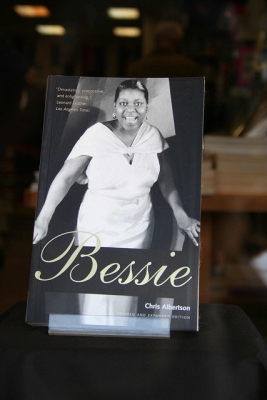The Empress of the Blues

Bessie Smith was called the Empress of the Blues – and more than 40 years after her death her music continue to live. Bessie Smith was born in Chatanooga, Tennessee, in the Southern part of the United States. It`s not clear exactly when she was born – either in 1893 or 1894.
Like almost all Negro families in the South at that time, Bessie`s parents were very poor. Her parents were dead by the time she was eight years old. Viola, her eldest sister, became mother to Bessie and her four other brothers and sisters. There were only two chances of work for black people in the terrible poverty of the South. They could get low paid jobs as servants or labourers, (if there were any jobs), or they could join a travelling show (if they could sing, dance or play a musical instrument). The black shows toured the country, stopping for a few nights at each town. The life was hard and the money was poor. As a young child, Bessie used to sing in the streets of Chatanooga, with her brother Andrew, who played the guitar. Passers-by used to throw them a few cents. So in 1912, Bessie joined a travelling show – but as a dancer. She began a professional career in entertainment that lasted 25 years. She quickly gained reputations as a blues singer, not a dancer, in many of the southern states. After only a few years, she had her own show and orchestra. By the 1920s she was popular with both white and black audiences who came to listen to the blues in the South and East of America.
The 1920s were Bessie`s best years. She earned a huge amount of money – a thousand or two thousand dollars a week – with her appearances in theatres and clubs. She was the most popular blues singer of that time. In these days, the blues boom was at its height and radio was reaching a wide audience.
The popularity of the blues started to die at the end of the 1920s. Audiences went to see the new “swing” bands or the “talking pictures”. The years of the Depression meant that theatres closed, and the record industry almost came to a complete end. Bessie Smith was still able to find work occasionally, although the days of a thousand dollars a week were finished. In 1933 she made some more records. In the following few years it looked at times as if she would return to her old successful career. That never happened.
Bessie Smith died in 1937 in a car accident. For many years after, her fans blamed Sothern racism for her death. It was said that Bessie was taken from the accident to a whites-only hospital where staff refused to treat her because she was black. The delay, according to the story, caused her death. Recent reports have said this story is untrue.
Bessie Smith`s voice at the end of her career, in those 1933 recordings, still has the powerful emotion, force and expression that gave her the title “Empress of the Blues”.
